Pastor Jim and Lori discuss the importance of Christians staying connected and not becoming disengaged in these critical times. With special guest Bobby Conner.
Continue reading
Tag Archives: Christians
Has The Church Surrendered?
Pastor Jim and Lori discuss the ever growing importance for the church to stand firmly in their faith and not surrender. With special guest Perry Stone.
Continue reading
Biblical Patterns and American Presidents
Pastor Jim and Lori discuss America’s leadership and its correlations with patterns in biblical history. With special guest Perry Stone.
Continue reading
Why You Must Prepare To Save Souls (Day 1)
Pastor Jim and Lori explain why it is important for Christians to prepare for the saving of souls. With special guests Ray Gano and Derek Gilbert.
Continue reading
The Age of Radicals (Day 1)
Pastor Jim and Lori discuss our freedoms in America today and our need for radicals who are willing to preach the Word of God. With special guest David Horowitz.
Continue reading
President Trump calls for prayer after shooting

By Kami Klein
In response to the shooting at Simpson Park in Alexandria of House majority Whip Steve Scalise along with the wounding of four others, President Trump called for prayer, reminding the nation: “We may have our differences, but we do well in times like these to remember that everyone who serves in this nation’s capital, above all, they love our country.”
In a special session just hours after the President’s press conference, House speaker Paul Ryan stressed to the Senate that “An attack on one of us, is an attack on ALL of us.” He remarked that the most memorable picture that he hoped would be remembered after this day was of the Democratic leadership engaged in prayer for the fallen. With great emotion in his voice he stated. “We are one House. The People’s House, and we are one in humanity.”
As followers of Christ, we understand the power of prayer and of God’s mercy. Praying is bipartisan and does not belong to one political party or the other nor is it only for our nation but for the entire world for we are all God’s children.
We must always remember the words of Jesus in Matthew 18:19-20 “Again I say to you, that if two of you agree on earth about anything they ask, it will be done for them by My Father who is in heaven. 20 For where two or three are assembled in My name, there I am in their midst.”
In his address to the press this morning, President Trump added that “we are strongest when we are unified and when we work together for the common good.” In this Church family, we stand together by the thousands, and we are asking that all of us join in prayer now for our nation.
Please pray for those that were wounded today, Steve Scalise, Officers Crystal Griner and David Bailey as well as Zachary Barth and Matt Mika. Pray for their quick recovery and for their family and friends as they must now be ready to help in their healing with loving support. Pray with gratitude for the protection of so many from what could have been a massacre and the law enforcement who put their lives on the line without a second thought. And pray with compassion for the suspect’s family who must also cope with the shock of this attack.
As Christians, we are commanded to love one another. This nation needs God’s love and as His children, we must be HIS example. Our first step must be in prayer.
Christians caught up in Philippines’ urban battle with Islamists

By Tom Allard
ILIGAN CITY, Philippines (Reuters) – Bishop Edwin Dela Pena was sipping coffee after dinner in a southern Philippines coastal town last Tuesday when he received a phone call: it was from one of his diocese priests, who sounded panicky and distressed.
Father Teresito “Chito” Sugarno, the vicar general of Marawi City, had been taken hostage by Islamist militants along with about a dozen of his parishioners.
“He was only given a few lines to deliver, and it was simply echoing the demands of the kidnappers – for the troops to withdraw,” said Dela Pena. If the demand was not met, he was told, “something bad would happen”.
There has been no further word from the group of Christians since they were caught up in a ferocious battle that has raged between Islamist insurgents and Philippines soldiers in Marawi for the past week.
As many as 180,000 people, about 90 percent of the population, have fled the usually bustling lakeside town nestled in lush tropical hills that, almost overnight last week, became a theater of urban warfare.
Philippines President Rodrigo Duterte declared martial law across Mindanao – the country’s southernmost island and an area the size of South Korea – as troops outside Marawi closed in on Isnilon Hapilon, who was proclaimed “emir” of Southeast Asia last year after he pledged allegiance to Islamic State.
Mindanao has long been a hotbed of local insurgencies and separatist movements: but now, Islamist fighters from Malaysia, Indonesia and other countries have converged in Mindanao, stoking fears that it could become a regional stronghold of Islamic State.
More than 90 percent of the Philippines’ 100 million people are Christian, but here Muslims are in the majority. In 1980 Marawi proclaimed itself an “Islamic City” and it is the only city in the country with that designation.
For the small Christian community of Marawi, however, life in the city had until recently been peaceful and prosperous.
“We don’t consider ourselves Muslims or Christians, we are just friends,” said Dela Pena, who has lived for 17 years in Marawi but was out of town when the violence broke out.
That peace was shattered some months ago, he said, after the army bombed an encampment of Islamist groups some 50 km (30 miles) away.
“They said they pulverized the whole camp, but these people simply transferred their base of operation from the jungle to the urban center, to the city, Marawi,” he told Reuters in an interview from Iligan City, 37 km (23 miles) from Marawi.
“They came in trickles, a few people at a time. They have relatives there. They lived, they recruited,” he said, adding that authorities appear to have missed the looming threat.
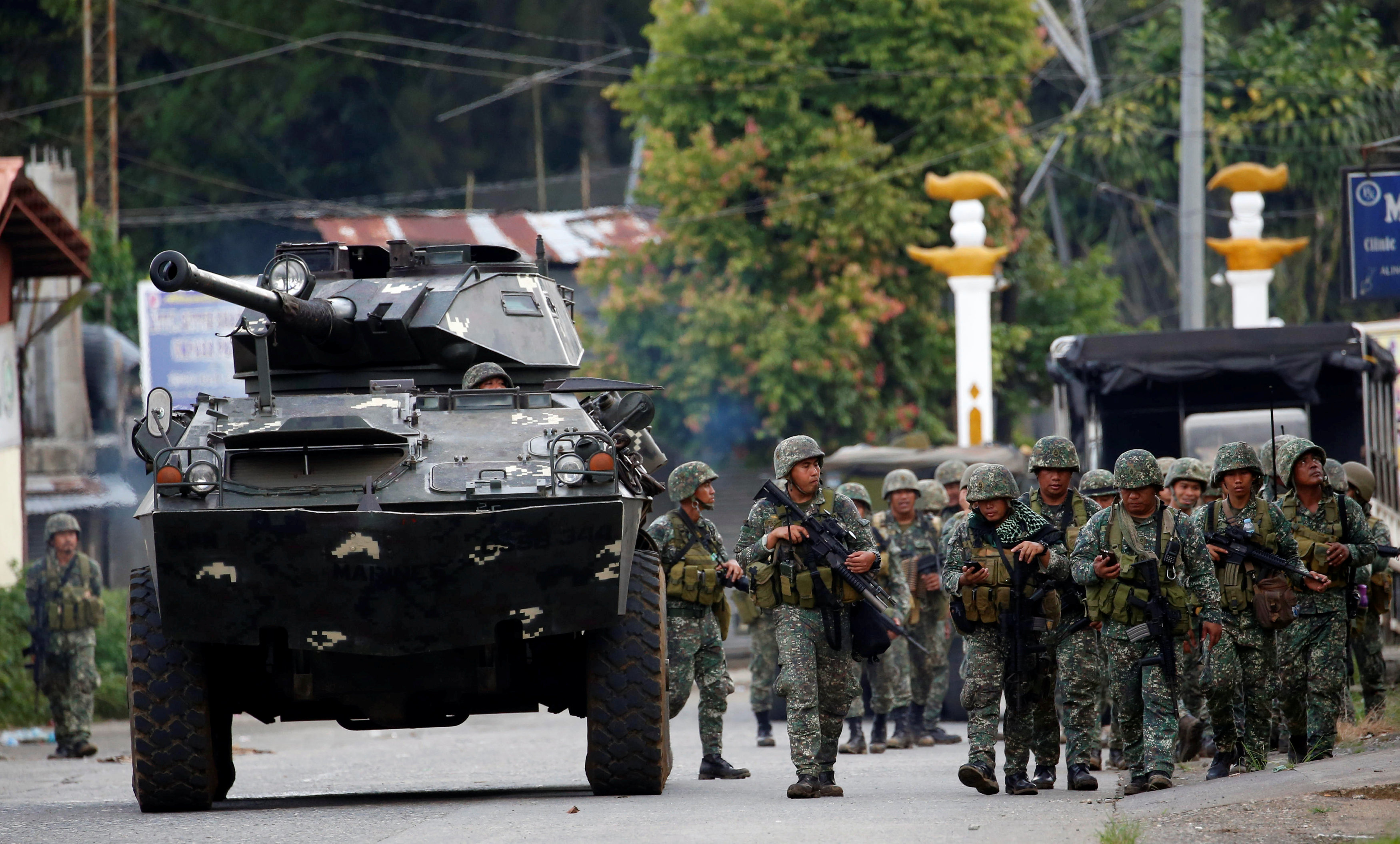
Members of Philippine Marines walk next to an armoured fighting vehicle (AFV) as they advance their position in Marawi City, Philippines May 28, 2017. REUTERS/Erik De Castro
CATHEDRAL ATTACKED AND TORCHED
Chaos was unleashed upon Marawi when troops searching for Hapilon were ambushed by heavily armed militants.
More than 200 local and foreign fighters from the Maute group and others allied to Islamic State fanned out across the city, seizing the main hospital and prison before attacking the Cathedral of Maria Auxiliadora.
Inside, nearby residents told Dela Pena, Father Teresito and a group of worshippers were decorating the church for a holy day to celebrate the life of Mary, a sacred figure in both Christianity and Islam.
Dela Pena said they ran to the nearby bishop’s house, hoping they would be safe there, but the militants burst in after them. That evening, after bundling their captives into vehicles, they torched the church, according to the residents.
Photos showing the priest, a young man and a woman slumped against a wall have circulated on the internet. Dela Pena believes they are being used as human shields by the militants.
“I cannot imagine. I have no words to describe it,” he said.
Still, he remains hopeful that the city can unite again. The vast majority of Marawi’s citizens, whatever their faith, are appalled by the violence and disruption, he said.
“I think we can begin something more effective in terms of working together, in terms of dialogue, in terms of peaceful coexistence,” he said. “After all, we have shared the same predicament.”
(Additional reporting by Karen Lema in MANILA; Editing by John Chalmers and Lincoln Feast)
Pope to Egypt to mend ties with Islam but conservatives wary

By Philip Pullella
VATICAN CITY (Reuters) – Pope Francis hopes to mend ties with Muslims on his trip to Egypt on Friday but faces criticism from church conservatives for meeting Islamic religious leaders after a spate of deadly attacks against Christians.
In a video message to the people of Egypt on Tuesday, Francis said the world had been “torn by blind violence, which has also afflicted the heart of the your dear land” and said he hoped his trip could help peace and inter-religious dialogue.
Security is a primary concern less than three weeks after 45 people were killed in attacks on Coptic Christian churches in Alexandria and Tanta, claimed by Islamic State, on Palm Sunday.
But Francis has insisted on using an ordinary car during his 27 hours in Cairo, continuing his practice of shunning armored limousines in order to be closer to people.
Francis will meet President Abdel Fattah al-Sisi; Sheikh Ahmed al-Tayeb, the Grand Imam of al-Azhar, the world’s most influential center of Sunni Islamic theology and learning; and Pope Tawadros II, head of the Coptic Orthodox Church, who barely escaped the Alexandria bombing.
Sisi declared a three-month state of emergency after the attacks.
A main reason for the trip is to try to strengthen relations with the 1,000-year-old Azhar center that were cut by the Muslim side in 2011 over what it said were repeated insults of Islam by Francis’s predecessor, Pope Benedict.
Ties with the center were restored last year after Tayeb visited the Vatican. Tayeb, widely seen as one of the most moderate senior clerics in Egypt, has repeatedly condemned Islamic State and its practice of declaring others as apostates and infidels as a pretext for waging violent jihad.
The Vatican says that Francis, who denounces the idea of violence in God’s name, is convinced that Christian-Muslim dialogue is more important now than ever. Papal aides say a moderate like Tayeb would be an important ally in condemning radical Islam.
In Tuesday’s message, Francis said he hoped the trip could bring “fraternity and reconciliation to all children of Abraham, particularly in the Islamic world, in which Egypt occupies a primary position” and “offer a valid contribution to inter-religious dialogue with the Islamic world”.
WAR OF RELIGION?
The pope’s views are not shared by all Catholics, however. Some conservatives say there should be no dialogue with Islam and that a “war of religion” is in progress.
Italian historian Roberto de Mattei said the Palm Sunday attacks should be “a brusque reality check for Pope Francis”.
The perpetrators were “not unbalanced or crazy but bearers of a religious vision that has been combating Christianity since the seventh century,” De Mattei, editor of the conservative monthly magazine Christian Roots, wrote in an editorial.
Novus Ordo Watch, an ultra-conservative Catholic blog, blasted the Vatican over the logo of the trip, which displays the Muslim crescent and the cross together, and derided the pope as “Mr. Coexist”.
A leading Catholic scholar of Islam, Egyptian-born Father Samir Khalil Samir, said that Francis meant well but was naive.
“I think his ignorance of Islam does not help dialogue. He has said often that we know that Islam is a religion of peace but this is simply a mistake,” Samir, who is based in Beirut, told reporters in Rome.
“We know there are certainly times of peace and a willingness for peace on the part of many Muslims but I can’t read the Koran and pretend that it is a book that is oriented towards peace,” he said.
The region has witnessed a massive exodus of Christians fleeing war and persecution in the past few decades, accelerated recently by the rise of Islamic State. Francis said in his message he hoped his visit could be a “consolation and … encouragement to all Christians in the Middle East”.
He will visit Cairo’s largest Coptic cathedral to pray for the 28 people killed in a Christmas season blast last year and lay flowers in their memory.
Rights activists are concerned about the pope’s meeting with President Sisi.
Sisi has sought to present himself as an indispensable bulwark against terrorism in the region, deflecting Western criticism that he has suppressed political opposition and human rights activists since he was elected in 2014.
Asked if the pope would raise human rights concerns, Vatican spokesman Greg Burke said Francis had made “trips more delicate than this one,” adding “let’s see what the pope has to say.”
(Additional reporting by Lin Noueihed in Cairo; Editing by Sonya Hepinstall)
Families gather after Egypt church attack, state of emergency approved

ALEXANDRIA, Egypt (Reuters) – Families of victims of Sunday’s bombing at Alexandria’s Coptic cathedral gathered at the Monastery of Saint Mina under heavy security on Monday as Egypt’s cabinet approved a three-month state of emergency ahead of a scheduled trip by Pope Francis.
Coffins of the 17 killed were lined up on the tiled square outside the monastery ahead of the funeral. Police checked cars as they entered the grounds, with hundreds of people gathered outside, and dozens of tanks lined parts of the road from Cairo.
The blast in Egypt’s second largest city came hours after a bomb struck a Coptic church in Tanta, a nearby city in the Nile Delta, killing 27 and wounding nearly 80.
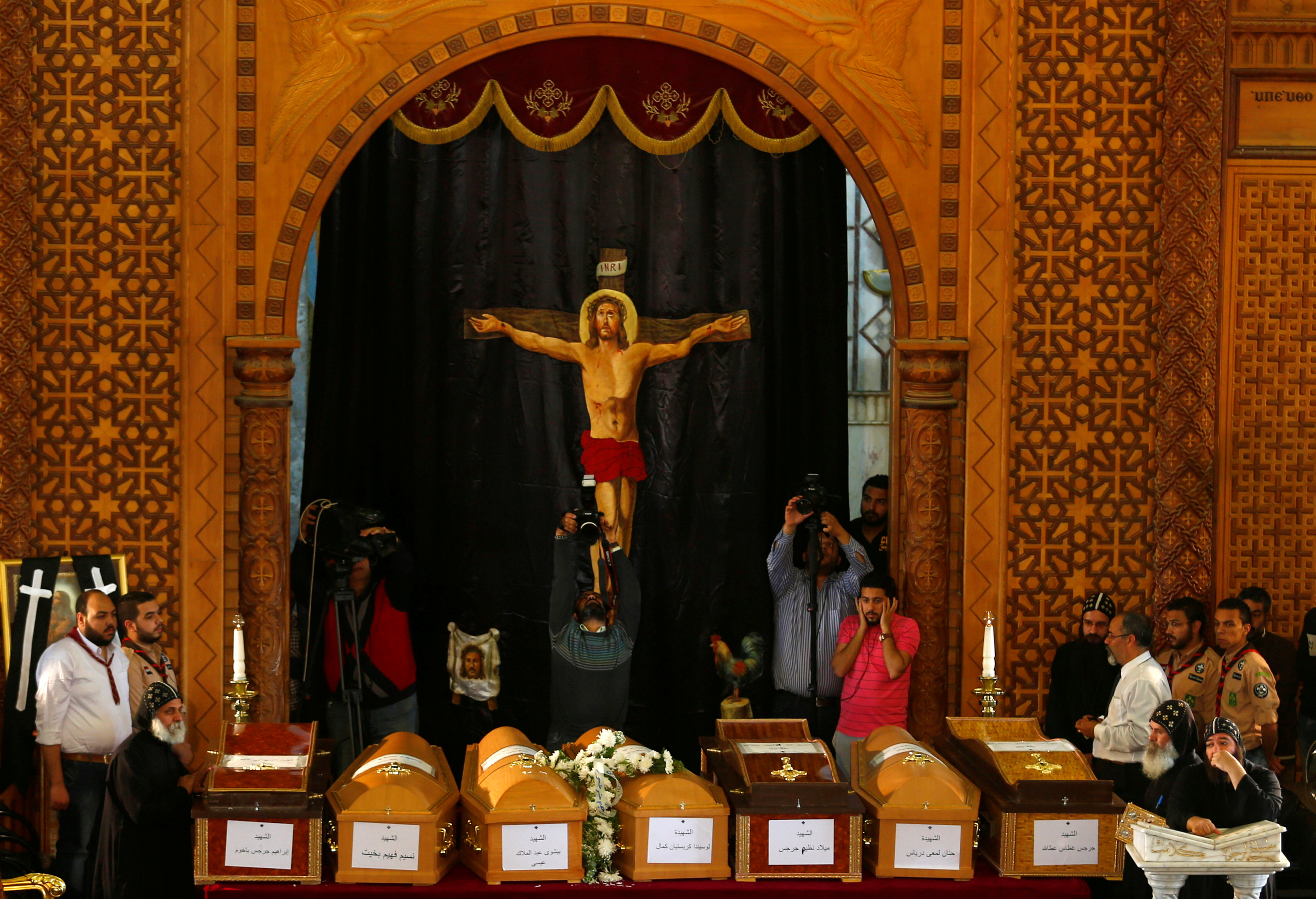
Egyptians attend the funerals of victims of the Palm Sunday bombings at St. Mina Coptic Orthodox Monastery “Deir Mar Mina” in Alexandria, Egypt April 10, 2017. REUTERS/Amr Abdallah Dalsh
Both attacks were claimed by the Islamic State, which has waged a campaign against Egypt’s Christian minority, the largest in the Middle East. The Copts, whose presence in Egypt dates to the Roman era, have long complained of religious persecution and accused the state of not doing enough to protect them.
Coming on Palm Sunday, when Christians mark the arrival of Jesus in Jerusalem, the bombings appeared designed to spread fear among Copts, who make up 10 percent of Egypt’s population.
They also raised security fears ahead of a visit to Cairo by Roman Catholic Pope Francis planned for April 28-29.
Coptic Pope Tawadros, who was leading the mass in Alexandria’s Saint Mark’s Cathedral when the bomb exploded, was not harmed, the Interior Ministry said.
The nationwide state of emergency declared by President Abdel Fattah al-Sisi and agreed by the cabinet on Monday is expected to be approved by parliament within seven days in order to remain in place.
“The armed forces and police will do what is necessary to confront the threats of terrorism and its financing,” the cabinet said in a statement. Measures would be taken to “maintain security across the country, protect public and private property and the lives of citizens,” it said.
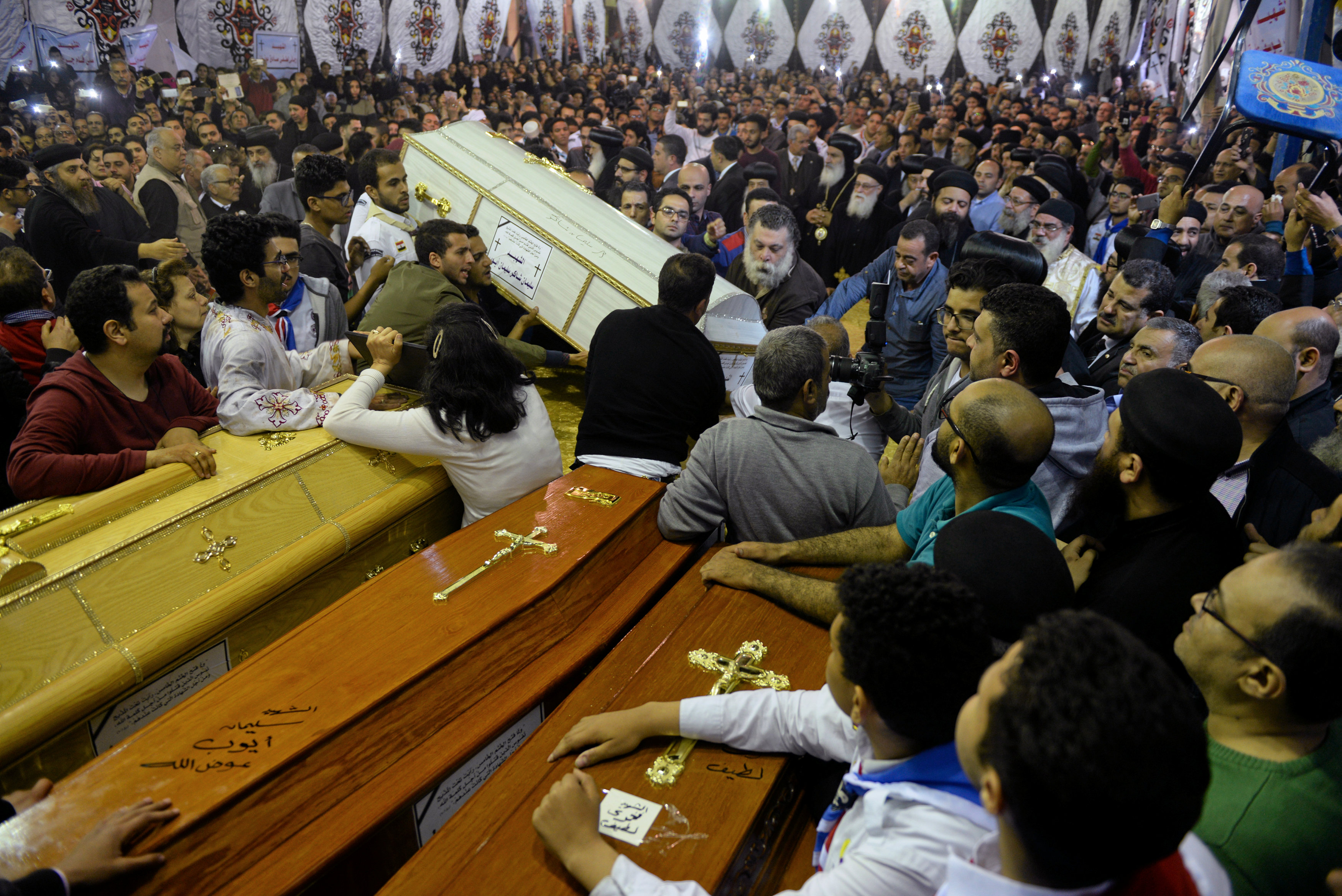
People watch as the coffins of victims arrive to the Coptic church that was bombed on Sunday, in Tanta, Egypt, April 9, 2017. REUTERS/Mohamed Abd El Ghany
SOFTER CHRISTIAN TARGET
In Tanta, where many families buried their dead on Sunday, members of the Coptic community expressed anger at the lack of security, saying that despite warnings of an attack, police had not stepped up efforts to protect them.
A senior police official told Reuters a bomb was discovered and disabled near the Tanta church about a week ago.
“That should have been an alarm or a warning that this place is targeted,” said 38-year-old Amira Maher. “Especially Palm Sunday, a day when many people gather, more than any other time in the year… I don’t know how this happened.”
At Tanta University hospital morgue, desperate families were trying to get inside to search for loved ones. Security forces held them back to stop overcrowding, enraging the crowd.
“Why are you preventing us from entering now? Where were you when all this happened?” shouted one women looking for a relative. Some appeared in total shock, their faces pale and unmoving. Others wept openly as women wailed in mourning.
Though Islamic State has long waged a low-level war against soldiers and police in Egypt’s Sinai peninsula for years, its stepped up assault on Christians in the mainland could turn a provincial insurgency into wider sectarian conflict.
On Sunday, the group warned of more attacks and boasted it had killed 80 people in three church bombings since December.
Security analysts said it appeared that Islamic State, under pressure in Iraq and Syria, was trying to widen its threat and had identified Christian communities as an easier target.
“ISIS are deeply sectarian, that’s nothing new, but they have decided to re-emphasize that aspect in Egypt over the past few months,” said H.A. Hellyer, senior non-resident fellow at the Atlantic Council and the Royal United Services Institute.
“Christian targets are easier — churches are far more difficult to fortify than say an army barracks or a police station. It’s a disturbing development because it indicates we have the possibility of repeated and continued attacks against soft targets.”
(Reporting by Osama Naguib; writing by Asma Alsharif; editing by Luke Baker and Sonya Hepinstall)
Iraqis celebrate Palm Sunday near Mosul for the first time in three years

By Ulf Laessing
QARAQOSH, Iraq (Reuters) – Hundreds of Christians flocked to the Iraqi town of Qaraqosh on Sunday to celebrate Palm Sunday for the first time in three years, packing into a church torched by Islamic State to take communion at its ruined altar.
In October, Iraqi forces expelled the Sunni Muslim militants from Qaraqosh as part of a campaign to retake nearby Mosul, the country’s second-largest city seized by the group in June 2014.
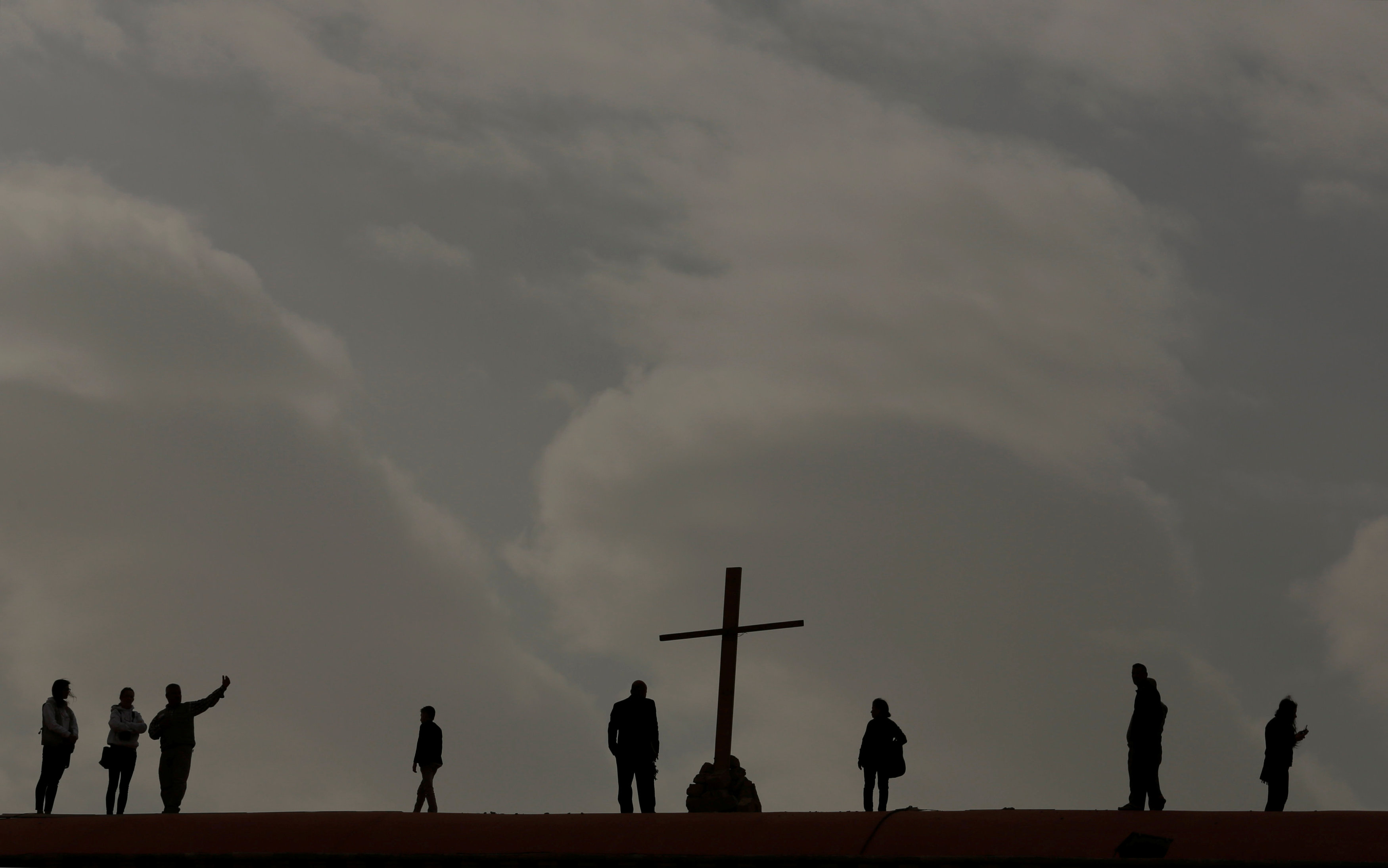
Iraqis boys visit the burnt out main church as others attend the first Palm Sunday procession in the Christian city of Qaraqosh since Iraqi forces retook it from from Islamic States militants, Iraq April 9, 2017. REUTERS/Suhaib Salem
Iraq’s biggest Christian settlement until the militants arrived, Qaraqosh has been a ghost town as most residents are still too afraid to come back with the battle for Mosul, located 20 kilometers away, still raging.
But on Sunday church bells rang again across the town.
Hundreds arrived in cars from Erbil, the main city in autonomous Iraqi Kurdistan where most Christian had fled when Islamic State gave them an ultimatum to pay special taxes, convert or die.
“We need reconciliation,” Syriac Catholic Archbishop of Mosul Butrus Moshe told worshippers in the Immaculate Conception Church guarded by army jeeps.
Islamic State has targeted minority communities in both Iraq and Syria, setting churches on fire.
Scribbled “Islamic State” slogans could be still seen on the church’s walls while torn-up prayer books littered the floor.
Escorted by soldiers carrying rifles, the congregation then walked through Qaraqosh for Palm Sunday, the start of Holy Week that culminates on Easter Sunday, holding up a banner saying “In times of war we bring peace.”
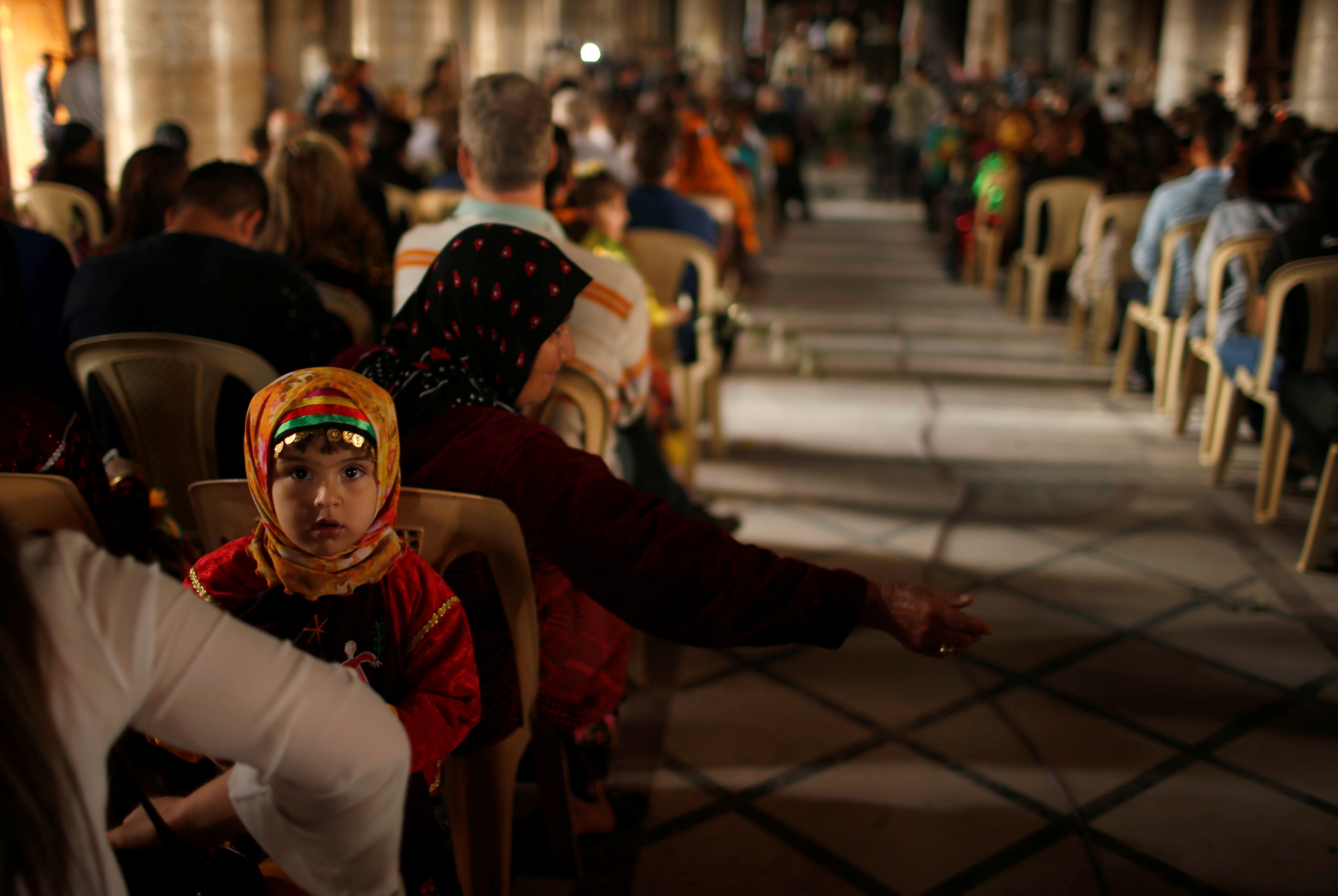
Iraqis attend the first Palm Sunday procession in the burnt out main church of the Christian city of Qaraqosh since Iraqi forces retook it from Islamic States militants, Iraq April 9, 2017. REUTERS/Suhaib Salem
Christianity in northern Iraq dates back to the first century AD.
The number of Christians fell sharply during the violence which followed the 2003 overthrow of Saddam Hussein, and the Islamic State takeover of Mosul purged the city of Christians for the first time in two millennia.
“Almost 75 percent of houses were burnt so if people return where can they live?” said Aziz Yashou, a worshipper. “We call for an international protection in order to live here.”
(Reporting by Ulf Laessing; Editing by Susan Fenton)